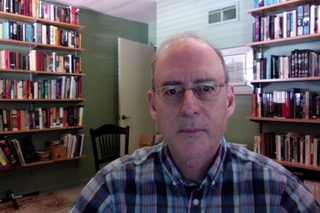“I can’t tell you how good it is to see you again, Paul,” she said, her starved gaze rarely straying from his face.
“It’s the same for me, Danni,” he replied, trying not to stare at her unhealthy thinness. “I have to admit, I was nervous. How does one catch up on twenty-seven years?”
“You don’t. We start again from scratch.”
“I never expected to be sitting here with you in the actual House in Carter’s Field.”
She smiled, and something of the old Danni was there again. “I forgot to mention that, didn’t I? I bought this house three years ago for almost nothing from an old Eastern Shore family who couldn’t believe their good luck. I came as a visitor, like you, and fell in love with the Bay. This little finger of land has hardly changed in a century. Its inwardness inspires me.”
“It is quiet here. Almost feels like Jackson Park when we were kids. Have you ever visited?”
“No, I’ll never go back there. I’ll never do a lot of things again.”
The curtain-less windows were all open, and an east wind from the sea rolled through. As he sat there with a direct view of the kitchen window, he glimpsed out of the corner of his eye what seemed to be someone standing with their back to him, facing the fireplace. But when he turned to look, there was nothing but a rack of fire tools and an ash broom. He attributed this to his chronic sleep deprivation over the last three months. Ordinary objects and people, when glimpsed peripherally, especially at night, could become hallucinated fragments of dreams. It had happened more than once at work, and he’d hardly begun catching up on his sleep. And Danni’s house, so alone in this wide, flat countryside, surrounded by miles of darkness, seemed to lend itself to fugitive impressions.
“Was the guy you married a local?” he asked.
Her brief smile was mirthless. “Same-sex couples can’t marry in Virginia.”
Embarrassed, he said, “True. But take the word of a Justice Department lawyer: that’s going to change.” Whatever he’d imagined seeing by the fireplace just now was of a feminine slenderness.
“Dare I say you look disappointed?” she said with a smile.
“I suppose I am, a little. Being almost forty and still single inclines one to long-shot hopes.”
A little color briefly came back into her face. “I’m flattered that you had any hopes, Paul. I know I’m… not what you expected.”
“I had no expectations, Danni, only fantasies. Were you happy with—may I know her name?”
“Saskia. She was Dutch-Indonesian. I met her at the Pike Place Market in Seattle. We had some great moments together, between fights. She said I loved art more than I loved her.”
“Was it true?”
“Yes,” she replied, with a flat tone of voice that surprised him. “The end wasn’t pretty. She swallowed pills.”
“Oh. But she recovered?”
She shook her head and covered her eyes with one hand. “I still love her, still miss her. Artists are monsters of selfishness. The good ones, anyway.”
“Nobody ever gets what they want,” he said. “Especially if they get it.”
Her smile was bleak. “Probably good, then, that we never got each other.”
“Are you all right, Danni?”
“Why? Do I look ill?”
“Only compared to your self-portrait.”
She laughed. “Still a diplomat. I painted that for Saskia, when I was thirty-five. But to answer your question, yes, I’ve been sick for a long time. Losing Saskia, all but killing her, really, too much solitude, breathing oil paint and failure every day—it added up. But seeing you, Paul, it’s helped.”
“I’m glad. And you’re not the only one who’s alone too much.”
“What happened to the snake?” she asked.
He smiled at her abrupt veer into the past. “I let it go.”
“Why?’
“It wouldn’t eat.”
“Where’d you turn it loose?”
“Where we found it.”
“Such a good boy. Did you ever wonder what inspired me to take that picture?”
“It was a beautiful snake.”
“Yes, but it was really the fallen tree behind you. You were there as perspective.”
“Then why title the painting, The Bone-House?”
“It’s an Old English metaphor for the body. Our house of flesh.”
“So the photo’s about the tree, but the painting’s about, what? Me?”
“You and the serpent of temptation,” she replied, looking down. “We were twelve, Paul.”
“Yes. Then Time started pushing us around, and here we are.”
“I was a confused kid. I liked girls, I liked boys. I was especially fond of a boy named Paul Eigenstadt.”
“I was quite blind to that, Danni. I’m sorry. Not that realizing it would have made any difference. You’d have moved anyway. And I guess in the end, girls won the toss.”
“Aren’t lawyers taught never to make assumptions?”
He laughed. “Yes, they are.”
There was a light on over the window in front of the kitchen sink, and as his gaze wandered past it, he saw the head and shoulders of a man wearing a dark felt hat briefly framed there, then disappear.
“There’s a man out there,” he said, getting up and walking over to the window. He couldn’t see anyone, so he went out the front door and around both sides of the house. Nobody there, either, and no obvious place for someone to hide. Mystified, he went back inside. Danni still sat on the couch and seemed either indifferent or unaware that he’d left the house. He was about to speak, when he saw that the person sitting there wasn’t Danni. It was a lean, dark-skinned young woman with hair even shorter than Danni’s, her long, thin arms crossed over her lap. She stared intently straight ahead, and he saw elements of the Far East and Northern Europe in her angular, exquisite face.
“Paul!”
He looked up. He was sitting in his chair. Danni was sitting where she’d been all along. What had just happened?
“Are you all right?”
“I don’t know,” he said. “I thought I saw a man pass by the kitchen window, so I went outside to look. But no one was there.”
“You haven’t moved from that chair,” she said, staring at him. “Unless we’re both seeing things.”
“It must be me,” he said, really alarmed, now. “Sorry. That’s never happened to me before, phasing out like that. For months, I’ve been working too hard and sleeping too little. But I was so sure I’d seen someone at the window.” He didn’t mention seeing the other woman. How could he? She would think she’d let a crazy man into her house.
“I’m not doubting you, Paul. But I don’t get many uninvited visitors here. None, actually. Not even prowlers.” After peering intently at him, she seemed to relax. “You know, I wasn’t going to say anything, but this is an unsettled house.”
“Haunted, you mean?”
“I’ll stick with unsettled. You could tell, couldn’t you? From the painting?”
“Well, I certainly felt something when I first looked at it—and before knowing that you’d painted it—a chill, I guess. But it was a sneaky chill, because you’d painted your house in bright sunlight.”
“The uncanny element is the same by day or night. I find it stimulating.”
“Is there a story associated with the house?”
“There may be. I don’t know. I wanted it too badly to ask embarrassing questions.”
He tried to reconcile what he thought had just happened with the unsurprised tone of this woman who’d just told him that he’d either dreamed or hallucinated the last minute or two. Danni had always been his most interesting friend, insatiably curious about the world around her, though at twelve her ambition was to be a scientist. The grown-up Danni had turned to art instead, but she seemed no less rational than the child he’d known. Yet something was very wrong here.
“What are you working on?” he asked, pointing to the covered painting on the easel.
“Sorry, but I never discuss a painting until it’s finished. An old superstition.”
“Understood. Well, what should we do? Take a drive?”
“Actually, Paul, I’d was hoping you’d sit for me.”
“You’re kidding.”
“No, I’ve been wanting to paint you since you walked in the door. I’ll just do a pencil sketch for now. Will you let me?”
“Okay.”
She excused herself and went upstairs. He heard water running and wandered over to the wall where the paintings were stacked. With a furtive glance over his shoulder, he lifted the first painting and turned it around. It was the boy in shorts again, himself, proudly posing, but this time without the snake. And the boy’s expression had been dramatically altered. He now had the burning, inhuman eyes and lecherous grin of a satyr.
Embarrassed, Paul quietly turned it back to the wall, then walked to the unfinished painting on the easel. He thought for a moment that he’d heard a faint murmur of voices from upstairs, but a gust of wind had just blown through the dead trees and brown grass outside, and he might have been mistaken.
He lifted the cloth from the work in progress and began to understand how little one can really know a childhood friend not seen for decades. This time, it was an oil painting of Danni and Saskia, and he was shocked to recognize her as the person he’d seen sitting in Danni’s chair during his dream, or whatever it was. They were in bed together, nude and passionately kissing while locked in a fierce embrace. Mounted on the wall over the bed was a finely detailed miniature of The Bone-House. On the far left side of the picture, staring at the lovers with widened eyes through a bedroom window, was his boyhood self again. But this version of him wasn’t Pan in a t-shirt; this boy’s expression was the shocked fascination of an innocent. Danni’s pale, freckled skin was almost ghastly contrasted against the rich brown of Saskia’s skin, and Danni’s red pubic hair was painted in so bright a shade that it seemed aflame.
As far as Paul’s inexperienced eye could determine, the painting was finished; it was even signed. But he couldn’t blame her for keeping its subject private, and he really had no business looking at it.
The style was a dramatic departure from the loose naturalism of the two paintings he’d bought. This one was almost photo-realistic, and yet the figures were stylistically exaggerated just enough to convey a rapture so all-encompassing that it seemed to be transforming even the room and its furnishings into ecstatic witnesses of their lovemaking. The color pallet leaned into shades of red, orange and yellow, and the stark leftward shadows suggested rising flames licking at the right edges of the canvas, just out of sight.
He heard footsteps on the stairs, and hurriedly covered the painting and moved to the center of the room. As she stepped into view, carrying a straight-backed chair and holding a large drawing pad, he wondered if she’d left him alone deliberately, assuming—even hoping—that he’d sneak a look at the covered painting. She set the chair to the left of an open window and asked him to sit.
“Don’t pose,” she said. “Just sit comfortably facing me, like you’re waiting to see the doctor.”
“Am I expecting good or bad news?”
She smiled. “Could go either way.”
She took the covered painting off the easel and leaned it against the wall, sat on the stool, arranged the drawing pad to her liking, then began making slow, careful strokes with a pencil, pausing for long periods to stare intently at his lifted face. She occasionally spoke in a low voice, more to herself than to him, making critical observations of his body. “Ears small, well-shaped, symmetrical,” she’d say, followed by, “Eyes spaced well apart, though the right one is the tiniest bit lower than the left. Widow’s peak slightly to the right of center. Nose broken… when?”
“Early eighties. Playing racquetball.”
“Do you still play?”
“No. I wanted to have my own knees at fifty.”
No doubt she was trying to keep him distracted from the growing stiffness in his neck and back, and also to see how his mouth moved as he spoke. He was impressed by her degree of concentration.
“How was life in Chicago?” he asked.
“A blur. Within a year, we’d moved to Cincinnati. From there, Dallas, then San Diego, and finally, Seattle. My father was good at finding jobs, but lousy at keeping them. Mother died when I was sixteen, and by then, my father’s drinking had made him all but unemployable. I left home at eighteen and never returned. Paid for art school on a small trust fund my parents had set up for me when I was a kid, and which had grown considerably by the time I needed it. My father died in 1994 of cirrhosis of the liver. So, you see why I cherish those years in Jackson Park, when my mother was happy, and my father had steady work in the phosphate industry. You were a big part of the most stable period of my life.”
“It was for me, too. I’m glad you finally found a place you wanted to live.”
“It was good for a while,” she murmured, her voice a halting monotone, as if she’d suddenly fallen into a trance. “We were almost happy.”
Her voice was fading as it had on the telephone. Her eyes closed and her head slumped forward, even as her hand continued sketching. Her breathing became deep and regular: she was asleep. The foyer light must have burned out, because the space behind the small circle of light shed by her reading lamp had gone dark.
He stared in uneasy bafflement at her sleeping form, then he heard something behind him, just outside the window, so faint at first that he might have mistaken it for wind through the grass. Then he was sure: they were slow, deliberate footsteps, swishing through the high weeds. He was about to turn his head and look when he noticed that the space just behind Danni had begun to deepen into a clot of shadows that had acquired a density distinct from the darkness of the room. He was slightly near-sighted and narrowed his eyes to understand what he was seeing, but although there was no definite shape, he knew something was there.
The footsteps outside had stopped now, and he heard what sounded like a rusty metal cap being unscrewed, then a sound of sloshing liquid, and a strong smell of paint thinner wafted through the window. He wanted to turn his head, to speak, to warn Danni that something dreadful was happening, but his chair-bound pose had become a frozen moment, and he couldn’t move or speak until the moment passed.
The only thing still moving in that panicked stasis was Danni’s arm. The strokes of her pencil became flashing blurs, like the flickering speed of the tiger beetles on their last shoreline. She stopped drawing and lifted her head, her eyes still closed, and let it fall back into the dark presence behind her, which supported it with hands of shadow, her breathing stertorous, dreaming darkly, he somehow knew, of him, her fantasy through all the rootless years, her Paul.
He smelled smoke, heard crackling flames and breaking glass behind him. Danni seemed to jerk in her sleep and her foot jostled the easel, and the drawing pad slid off and hit the floor. He tried to see what she’d drawn before the quickly spreading flames turned it black and set it afire. He fought to move, to shout, to breathe, but he might as well have been tied to the chair, and the last thing he saw was Danni, never again to awaken from her dreaming sleep, and whatever was draped over her like a blanket of shadows. Then the flames rose up and engulfed them. He struggled, screamed, and died.
He came to on the ground, a few yards from his car, stiff, cold and wet with dew. He looked at his watch, and was shocked to find that it was almost four a.m. Had he passed out on the way into the house? Had he even gone inside? He sat up and looked around. There was no house. He was alone in a clearing of tall summer grass and old sycamores in full leaf. A vast field of young corn, starting a few yards from the edge of the clearing, stretched away to the north and west. He rose shakily and walked toward the place where the house had stood on his arrival. All that remained was a fire-blackened patch on the ground, and from no recent fire, since shoots of young grass were growing through the scorched soil.
His throat was very dry, and he remembered that she hadn’t offered him anything to drink. A confusion mounting to panic welled up, threatening to overwhelm him. He tried to suppress his thoughts, to convince himself that he’d had some kind of fainting spell, and while passed out on the ground had dreamed his encounter with Danni, her companion, and the arsonist. He had to get away from this place, back to Brightside House. Her paintings were there, which along with his memories, he now knew, were all he would ever have of Danea Finch.
But as he reached up to brush a piece of grass out of his hair, he caught a scent on his cuff, and then on his skin, so subtle as to border on imaginary, the fading smell of wood smoke.
About the Author
 Jeffrey Greene was born in Michigan, raised in Florida, and currently lives in Bethesda, Maryland. He has been writing and publishing short stories and the occasional novella since the 1980s. Some of the publications in which his stories have appeared are the North American Review, Tomorrow Speculative Fiction, Oasis, Reactor Magazine, Potomac Review, decomP Magazine, Zahir Speculative Fiction, and most recently, Bewildering Stories.
Jeffrey Greene was born in Michigan, raised in Florida, and currently lives in Bethesda, Maryland. He has been writing and publishing short stories and the occasional novella since the 1980s. Some of the publications in which his stories have appeared are the North American Review, Tomorrow Speculative Fiction, Oasis, Reactor Magazine, Potomac Review, decomP Magazine, Zahir Speculative Fiction, and most recently, Bewildering Stories.
His short story, “The Blind Gambler,” was included in the anthology,“100% Pure Florida Fiction,” in 2000, published by the University of Florida. He has self-published two collections of short stories: Stories From the Cold Room, and The Iron Desert and Other Stories.
![]()






